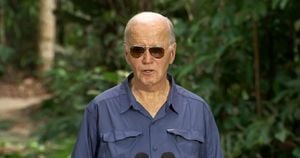Benny Tai, a prominent legal scholar and pro-democracy advocate, was recently sentenced to ten years in prison for his role in what has been termed the largest national security case to date in Hong Kong. Along with him, 44 others, including notable figures like Joshua Wong, faced lengthy prison terms, marking a significant escalation of the crackdown on dissent following the 2019 protests.
The sentencing occurred on November 19, 2024, as part of the aftermath of the city’s measures to suppress political opposition under the controversial national security law imposed by Beijing. This law, which came about after the massive anti-government demonstrations, criminalizes acts of secession, subversion, and collusion with foreign forces, significantly curtailing freedoms once taken for granted.
Tai’s case highlights how many activists were arrested following their attempt to organize unofficial primary elections for pro-democracy candidates, aiming to leverage what they viewed as their democratic rights granted under Hong Kong’s Basic Law. Observers have noted the unconventional procedures of the trial, which lasted 118 days and was overseen by judges chosen by the Beijing-backed Hong Kong government, effectively bypassing many legal protections normally afforded to defendants.
The prosecutors portrayed the group as conspiring to overthrow the government, framing their electoral strategy as insurrection. This narrative, vigorously upheld by the authorities, has raised serious concerns about the future of civil liberties and political discourse within the territory.
Joshua Wong, who has become one of the faces of the pro-democracy movement, was sentenced to just over four years. Before his conviction, he already was incarcerated from earlier protests. His fiery declaration “I love Hong Kong” as he left the courtroom encapsulated the sentiment many feel toward the city’s continued struggle for political freedoms.
Included among the 45 sentenced were journalists and activists like Gwyneth Ho and former lawmakers who participated actively in the democratic process. Ho received seven years for her involvement, drawing significant criticism for the notion of punishing journalists engaged in advocacy and reporting, activities typically protected under free speech norms.
The outrage surrounding these sentences was palpable, with critics denouncing the legal proceedings as politically motivated, citing the trial not as just law enforcement but as part of a broader campaign to silence dissent and deter future activism. Human Rights Watch condemned the sentences as reflective of the drastic decline of Hong Kong’s civil liberties since the national security law was enacted.
These lengthy sentences have been met with immediate international backlash. Australia and the United States have condemned the trial, viewing it as politically charged and aimed at silencing opposition voices. The Australian Foreign Minister expressed “grave concerns” over the treatment of its citizen Gordon Ng, who also received significant imprisonment terms for engaging too freely with the electoral process.
During the pro-democracy protests of 2019, sparked by proposed changes to Hong Kong's extradition laws, hundreds of thousands took to the streets, demanding not just the withdrawal of the law but also broader democratic reforms. The anger stemming from this legislative proposal quickly morphed, with calls for direct elections and greater autonomy being central themes of public dissent.
Following the unrest, Beijing enacted the unprecedented national security laws, fundamentally altering the political playing field—it has since become evident how these laws are used to penalize political activity deemed contrary to the interests of the state. The recent mass sentencing exacerbates fears among citizens about their freedom to express political beliefs and engage politically without repercussion.
Supporters of the pro-democracy activists rallied outside the courts, asserting their solidarity with those sentenced and voicing their frustration with both local and Chinese authorities. The situation has seen numerous individuals either fleeing abroad or going underground to continue advocating for democracy.
Experts believe these actions represent more than just legal repercussions; they symbolize the stifling of democratic aspirations among Hong Kong’s citizens. With over 286 arrests recorded since the implementation of the national security law, there's a growing concern about the chilling effect this has on political participation and expression.
Despite being labeled as insurrectionists for seeking to advance democratic representation, activists like Tai have described their attempts as constitutional under Hong Kong's Basic Law. Critics maintain this perspective, arguing for the inherent rights of citizens to engage politically. Pro-democracy advocates express hope, albeit dimmed, for the future, holding onto the belief the spirit of democracy will persist against overwhelming odds.
This episode has broad ramifications for Hong Kong, raising existential questions about its identity and governance. The pro-democracy movement may have encountered significant setbacks, but the resilience of its proponents signals the continuation of the fight for the fundamental rights and freedoms long cherished by many.
Consequently, this mass sentencing, along with the stifling political climate, reflects how far Hong Kong has transitioned from its past of vibrant civil liberties to what many now see as echoes of authoritarian practices more akin to those found on the mainland.
Importantly, the international community watches closely. How these events play out will influence perceptions of China’s commitment to its promises to maintain the “one country, two systems” framework originally promised to Hong Kong under British handover arrangements. The clampdown on dissent may well serve as both strategy and warning to any who might oppose the centralized control of Beijing. Meanwhile, Hong Kong’s future hinges on the interplay of these factors: the resistance of its people and the extent to which broader global awareness can impact local realities.



